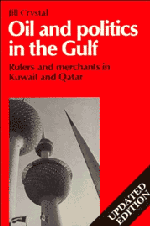Book contents
2 - History's legacy: Kuwait and Qatar before oil
Published online by Cambridge University Press: 04 April 2011
Summary
The one historical gift geography gave the tribes of the Gulf before oil was a gift of default: an outward orientation. Regional subsistence has always depended on the vagaries of long-distance trade routes. When trade was good, small settlements emerged to rival each other in carrying the traffic. When trade withered, routes shifted, or droughts deepened, then central regulation weakened, alliances changed, rivalries turned to war and tribes moved, with belongings and dependants, on camels and boats, up, down and across the Gulf. Until well into the modern period, the history of the Gulf has been one of ceaseless migration in search of trade and fresh water. As a result, the tribes of the region have always oriented themselves less to their original tribal ranges than to the fringes of the Gulf and the trade beyond.
Although Kuwait and Qatar were not populated by the ancestors of today's inhabitants until recently, transitory trade settlements there date back to ancient times. In Kuwait, ruins on Failaka island show settlements from perhaps 1000 BC. Archaeological evidence indicates that Qatar, too, was inhabited in prehistoric times; implements have been found dating back to 4000 BC. The Gulf's integration into the modern world economy began in the sixteenth century when the Portuguese captured several Arab ports, including Hormuz and Muscat. Portugal's presence meant a decline not only in their trading wealth but also in their political independence.
- Type
- Chapter
- Information
- Oil and Politics in the GulfRulers and Merchants in Kuwait and Qatar, pp. 15 - 35Publisher: Cambridge University PressPrint publication year: 1990



